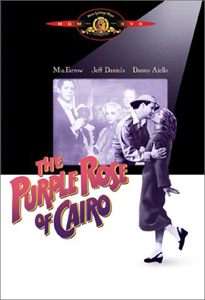“The Purple Rose of Cairo” (1985) is a sweetly whimsical Woody Allen picture that demonstrates a love for cinema along with a healthy understanding of the differences between fiction and reality. Because it’s so smartly made – in the screenplay, the direction, and the technical and design elements – the whimsy is never cloying, always charming.
Sweet natured
While Allen has written much funnier films, it seems like a conscious effort on his part that “Cairo” is sweet-natured rather than gut-busting. It’s clearly an Allen film because of the old-timey music transitions (“Cheek to Cheek” is the main song) and the occasional tossed-off one liner.
For example, Cecilia (Mia Farrow) notes that “I just met a wonderful new man. He’s fictional, but you can’t have everything.” That could be a line from a 1980s Zucker Brothers or Mel Brooks movie, and while “Cairo’s” dialog is always natural, it rarely delivers such zingers.

“The Purple Rose of Cairo” (1985)
Director: Woody Allen
Writer: Woody Allen
Stars: Mia Farrow, Jeff Daniels, Danny Aiello
As “Cairo” portrays people finding little slices of relief during the 1930s Depression, Farrow makes a fine Everywoman, a waitress who escapes into the movie theater, particularly to watch the film-within-this-film of the same name.
It’s believable that Cecilia is stuck in an abusive marriage with thuggish Monk (Danny Aiello), and that Tom Baxter (Jeff Daniels) falls in love with her at first sight, and that she could be a pawn in the scheme of actor Gil Shepherd (also Daniels).
Dual Daniels
While casual movie fans may think of Daniels breaking out in 1994’s “Dumb and Dumber” (I admit I was in this camp), he’s great here in dual roles as perfect (because he’s fictional) pith-helmet-wearing explorer Tom and as charming but imperfect (because he’s human) actor Gil.
The characters in the movie-within-a-movie – including “Gilmore Girls’ ” Edward Herrmann – are quick to note that Tom is a minor character, and yet their movie’s plot stops dead when Tom walks out of the screen to meet Cecilia, who he has noticed is a regular in the audience. It’s probably not intended, but it serves as a comment on how Daniels breaks out here.
Recreating the 1930s
The technical quality of “Cairo” is top-shelf, as Cecilia’s and Monk’s apartment, the sidewalks and porches, and the rundown area where the under-employed Monk shoots pennies all look like the 1930s.
Meanwhile, the film-within-a-film looks like one of those romping black-and-white charmers with quick-witted, high-class characters. The split-screens and other techniques that allow Tom and Gil to interact, or allow the “movie” characters and real people to have a conversation, are also flawless.
The film benefits from using that trick wherein it has only one fantasy element – Tom Baxters at screenings all over the country are emerging into reality – but treats everything else seriously. We’re willing to go with it because it’s only asking this one leap of logic from us, and it’s a fun leap. It’s also a potentially hilarious one, and that potential is most achieved when Tom is lured to a brothel by Emma (Dianne Wiest), having no clue what such a thing is.

Reel world meets real world
The 1993 Shane Black film “Last Action Hero” would later put a movie character in the real world, but that’s a clunkier effort. “Cairo,” while often passing on big laughs in favor of big-eyed romanticism, is a much smoother treatment of this concept as Allen comments on what’s appealing and unappealing about both fiction and reality. When Cecilia has to choose between the two, the choice is not obvious, especially since she lives amid the Depression.
Indeed, even after she makes the choice, “The Purple Rose of Cairo” continues to explore whether it’s the right one. If Cecilia ends up getting lost in a fictional realm rather than engaging with reality, Allen doesn’t necessarily blame her for that or view such a decision as a tragedy.
While “Cairo” lacks a profound sense of sadness just as it lacks belly laughs, the sweetness and innocence is always there. Absolving himself along with his audience, Allen comes down on the side that you don’t have to apologize for loving the art form of film.

